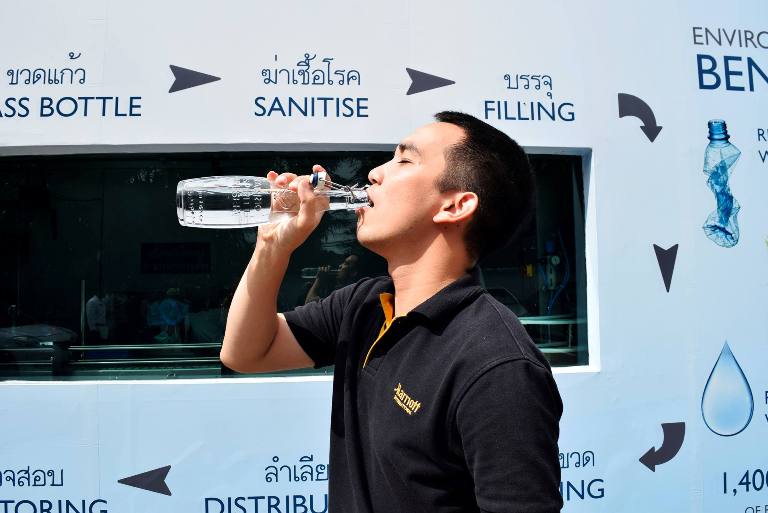
South Africans Helping Solve Thailand’s Massive Plastic Problem with ‘Water from Air’
Staying at a hotel on the Thai island of Koh Samui in 2015, South African born Meghan Kerrigan noticed the four bottles of water she was given every day were clogging her bin with plastic. Outside her door, Chaweng beach was smothered in rubbish. It was then that she and Kohler brothers, Ryan and Matthew, […]

Staying at a hotel on the Thai island of Koh Samui in 2015, South African born Meghan Kerrigan noticed the four bottles of water she was given every day were clogging her bin with plastic.

Outside her door, Chaweng beach was smothered in rubbish. It was then that she and Kohler brothers, Ryan and Matthew, had a “light-bulb moment”.
“Instead of trying to solve the problem by cleaning the beaches every day, let’s go to what the source of the problem is, and take the plastic bottle away,” said Kerrigan, now 31.
In 2016, the trio founded startup company Generation Water, based on the Thai resort island of Phuket.
They partnered with Marriott, the world’s largest hotel brand, in January 2017 to come up with a sustainable alternative to plastic bottles that would be commercially competitive and meet the needs of resorts and authorities.
Two years on, the South African-born entrepreneurs explained the workings of a pilot water plant at the JW Marriott Phuket Resort & Spa on Mai Khao beach, next to slogans saying ‘Save Water Drink Air’; and ‘Made 100% from the air’.
Here, in the sweltering heat, two water generators suck in vapour from the air, which then condenses into water when it hits cold coils.
The water drips into tanks, making 4,000 litres a day. It is filtered, minerals are added, and it is put into reusable glass bottles. These are placed into 445 guest-rooms at the JW Marriott Phuket and neighbouring Renaissance Phuket Resort & Spa.
The bottled water is also being trialled at two Marriott vacation clubs nearby.
The move is part of a wider effort on the holiday island to cut down on plastic bottles, rife in the hospitality industry, and a major problem in Asia and its travel hotspots.
Sustainable Shift
In many parts of Asia, tap water is unsafe to drink, so hotel guests get complimentary water, mostly in plastic bottles.
As much as 60 percent of the plastic found in the ocean comes from five Asian nations, including Thailand, according to U.S.-based non-profit group Ocean Conservancy.
In 2017, the United Nations Economic and Social Commission for Asia and the Pacific organised a forum to encourage sustainable water management on resort islands.
On Phuket, which is half the size of Hong Kong, more hotels are being built, and water is already in short supply.
Trucks navigate crowded roads as resorts without their own catchment area bring in water from reservoirs.
Phuket was the world’s 11th top city destination in 2017, with 11.6 million international arrivals, according to global research company Euromonitor International.
To cope with the environmental impacts of this influx, nearly 70 hotels from the Phuket Hotels Association have pledged to cut plastic bottles and straws by the end of 2019.
Since Marriott started producing its own water four months ago, it has stopped more than 100,000 plastic bottles from entering landfill or oceans, the chain says.
It plans to expand the scheme to all Marriott resorts in southern Thailand, handing out 4 million glass bottles.
‘Climate Positive’
The water from air technology uses 78 percent less energy than producing standard bottled water, has a lower carbon footprint, and is about a third cheaper, Generation Water says.
Nor does the system rely on pulling water from the ground, rivers or lakes.
Guests here have reacted positively since the bottled water was introduced in September, happy that finally a big brand made a move, she said.
They also like the taste. Michael Lawson, a lawyer from Sydney sitting at the Sala Sawasdee lobby bar, said his children were “quite picky” about water. “But it’s very refreshing and they are fighting over it in the room,” he said.
Downstairs in the Siam Deli, teenage student Jeremy Frydman from Melbourne said it was better than tap water at home.
Thailand’s food and drug administration approved Generation Water last August, and the company is now expanding.
Generation Water’s goal is to stop 1 billion 500 ml plastic bottles from entering landfill and the oceans every year by the end of 2021 – equal to supplying 3,000 hotels of 250 rooms.
Source: Thomson Reuters Foundation
(Reporting by Marianne Bray; editing by Megan Rowling and Jennie Glover)
http://news.trust.org/climate
